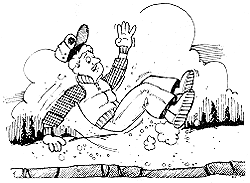Slips,
trips and falls in the farm workplace can result in serious
injury or death. Following is a brief summary of the major
causes of falls, along with pointers for avoiding such incidents.
Work areas and passageways should be kept clear. Objects should be returned to organized storage areas after use. Children, toys and pets are dangerous additions to farm work areas.
Slips and
trips on the same level often cause falls into operating machinery,
such as elevators, feed grinders, conveyors, etc. Repair flooring
that is broken or uneven. Cover slick floors with skid-resistant
materials or paint. Oil or water spills should be cleaned up
immediately.
Stairs
should be well maintained and properly lit. Provide sturdy
handrails. Keep step free of ice, snow, mud, manure, grease,
grain, or hay. Avoid clutter--boxes, buckets, tools, and other
items should never be stored on stairs. Don't carry a load
that blocks your vision while climbing or descending stairs.
Take your time, and watch where you are going.

While most
falling accidents occur on the level, special care is required
during 'high up' maintenance or construction work, such as painting
or roofing.
- Fasten
roof ladders securely.
- Footwear
should grip the surfaces on which you are working.
- Keep
materials and tools well secured and within easy reach.
- Don't
work on exposed, high places when conditions are stormy
or windy.
- Don't
work 'high up' when you are tired, ill, or taking strong
medication.
Many serious
injuries are caused by falls from and into moving farm machinery.
To prevent falls during farm machinery operations:
- Keep
children off of and away from machinery.
- Never
allow anyone to ride on the drawbar, or on towed machinery.
- Stay
clear of operating machinery when there's no need to be
near. Keep at least six feet away when walking by machinery,
so that a slip or stumble won't cause you to fall into moving
parts.
- Never
jump on or off equipment that is moving. Dismount only after
the tractor or vehicle has come to a complete stop.
- Use
handrails and ladders on self-propelled equipment. Keep
steps clean.
- Wear
proper footwear. Clean mud, snow, grease, or manure off
of shoes or boots before attempting to mount tractors or
self-propelled equipment.
- Drive
slowly over rough ground. Watch for obstructions such as
limbs, low building entrances, lines, etc. that could brush
you off of a vehicle.
Purchase
safety-approved, good quality ladders. Never try to economize
with a damaged or shaky ladder. Always follow the 4-to-1 rule--set
ladders one foot out for every four feet up. Keep your body
between the ladder rails. It's better to move than risk a fall.
Don't stand on the top three rungs of a straight ladder, or
the top two steps of a stepladder.
Most falls
can be prevented by taking the time to consider the situation,
and instituting proper measures to avoid or eliminate the 'fall
potential.' Time spent cleaning up a spill or moving objects
out of the way will be much less than the time needed to recuperate
from an injury caused by a fall.
Farm
Safety Association Home Page
Disclaimer and Reproduction Information: Information in
NASD does not represent NIOSH policy. Information included in
NASD appears by permission of the author and/or copyright holder.
More
